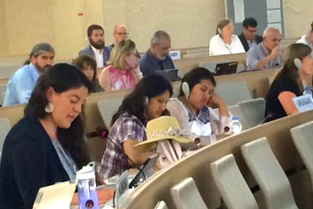
It is essential that Indigenous voices be heard on the international stage. At issue is how Indigenous Peoples can best participate in a United Nations structure that was not set up to include them.

A number of meetings of world Indigenous Peoples were held throughout 2015 and 2016. These meetings focused on the Alta recommendation, to establish a body at the UN to monitor implementation of the Declaration. The body was called the Expert Mechanism on the Rights of Indigenous Peoples (EMRIP) and the meetings focused on how to best enable it to review states’ compliance with the Declaration. Ultimately, in September 2016, the United Nations passed a resolution that expanded and improved the EMRIP mandate by adding members, meetings, autonomy, and responsiveness for the group. The resolution A/HRC/33/L.25 can be found at the United Nations website.
Since that time, the world Indigenous community is focused on the second recommendation and improving participation of Indigenous institutions at the United Nations. Historically, Indigenous Peoples have had to appear in most United Nation bodies as non-governmental organizations, which is unacceptable to Indigenous Peoples’ governments and representative institutions. Indigenous representatives met in November and consultations with member states began in December 2016 and continued through July 2017. The UN General Assembly committed in September 2017 to continue to consider the issue for the next five sessions, and directed that additional regional consultations take place and that a report be compiled. Submissions by Indigenous Peoples and member states can be found at https://www.un.org/development/desa/indigenouspeoples/reports-by-members-of-the-permanent-forum.html.
The United Nations Permanent Forum on Indigenous Issues (UNPFII) is a high- level advisory body to the Economic and Social Council. The Forum was established to deal with Indigenous issues related to economic and social development, culture, the environment, education, health and human rights.
On April 23, 2019, NARF Staff Attorneys Sue Noe and Kim Gottschalk represented the National Congress of American Indians (NCAI) at the UNPFII Eighteenth Session, which focused on traditional knowledge. While there, they submitted a statement on the importance of international attention to traditional knowledge:
It is crucial to have this discussion on traditional knowledge because of the important contributions traditional knowledge makes to the world, because of the vulnerability of traditional knowledge to misappropriation, and because of the undermining of the traditional context in which such knowledge is generated and transmitted.
The statement goes on to makes recommendations for the participation of Indigenous representatives and protection of traditional knowledge.